VENETOCLAX - ORAL
PHONETIC PRONUNCIATION: (ven-ET-oh-klax)
COMMON BRAND NAME(S): Venclexta
GENERIC NAME(S): venetoclax
Uses
USES: This medication is used to treat a certain type of cancer (chronic lymphocytic leukemia-CLL). Venetoclax is a chemotherapy drug that works by slowing or stopping the growth of cancer cells.
How to use VENETOCLAX - ORAL
HOW TO USE: Read the Medication Guide provided by your pharmacist before you start taking venetoclax and each time you get a refill. If you have any questions, ask your doctor or pharmacist. To help prevent side effects, drink 6 to 8 glasses (about 56 ounces/1660 milliliters) of water each day, starting 2 days before your first dose, on the day of your first dose, and each time your dose is increased. Take this medication by mouth with a meal and water as directed by your doctor, usually once daily. Swallow the tablets whole. Do not chew, crush, or break the tablets before swallowing. If you vomit soon after taking a dose, do not take another dose on the same day. Take your next dose at the regular time. The dosage is based on your medical condition and response to treatment. To reduce your risk of side effects, your doctor may direct you to start this medication at a low dose and gradually increase your dose. Follow your doctor's instructions carefully. Use this medication regularly to get the most benefit from it. To help you remember, take it at the same time each day. Do not increase your dose or use this drug more often or for longer than prescribed. Your condition will not improve any faster, and your risk of serious side effects will increase. Avoid eating/drinking grapefruit products, Seville oranges (often found in marmalade), or starfruit while using this medication unless your doctor or pharmacist says you may do so safely. These can increase the chance of side effects with this medicine. Ask your doctor or pharmacist for more details.
Side Effects
Precautions
Interactions
Overdose
Images
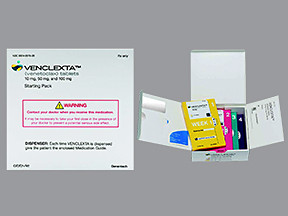
- color
- multi-color (2)
- shape
- other
- imprint
- V, 10 or 50 or 100
Reviews
Faq for VENETOCLAX - ORAL
Venetoclax is used to treat certain types of chronic lymphocytic leukemia (CLL), small lymphocytic lymphoma (SLL), and acute myeloid leukemia (AML) in patients who have specific genetic mutations.
Venetoclax belongs to a class of drugs called BCL-2 inhibitors. It works by blocking a protein called BCL-2, which helps cancer cells survive. By inhibiting BCL-2, Venetoclax promotes programmed cell death, leading to the elimination of cancer cells.
Common side effects of Venetoclax include nausea, diarrhea, upper respiratory tract infection, fatigue, musculoskeletal pain, fever, and cough. It is important to contact your doctor if you experience any severe or persistent side effects.
Venetoclax is usually taken once daily with a full glass of water and with food. Your doctor will prescribe the appropriate dosage based on your medical condition and response to treatment. It is important to follow the instructions provided by your healthcare provider.
Before starting Venetoclax, inform your doctor about any other medications you are currently taking, including over-the-counter drugs and herbal supplements. You should also inform your doctor about any medical conditions you have, such as liver or kidney disease, as it may affect the dosage and safety of Venetoclax.
Yes, Venetoclax can interact with certain medications, including those that affect liver enzymes such as rifampin, ritonavir, and St. John's Wort. It is essential to inform your doctor about all the medications you are taking to ensure there are no potential drug interactions.
Venetoclax may harm an unborn baby, so it is not recommended during pregnancy unless the potential benefits outweigh the risks. It is also not known whether Venetoclax passes into breast milk, so breastfeeding should not be done while taking this medication.
The duration of Venetoclax treatment will depend on your specific medical condition and response to the medication. Your doctor will determine the appropriate treatment duration and may adjust it as necessary.
Venetoclax can cause a potentially serious condition called tumor lysis syndrome, characterized by an electrolyte imbalance in the body. Your doctor may monitor your blood closely for signs of this condition and prescribe medications to prevent it.
Disclaimer
IMPORTANT: HOW TO USE THIS INFORMATION: This is a summary and does NOT have all possible information about this product. This information does not assure that this product is safe, effective, or appropriate for you. This information is not individual medical advice and does not substitute for the advice of your health care professional. Always ask your health care professional for complete information about this product and your specific health needs.
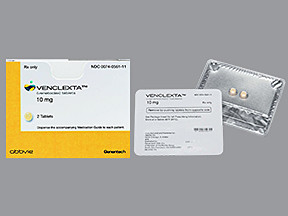
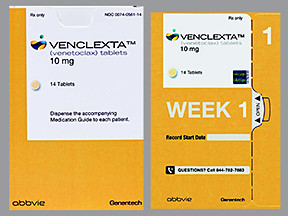
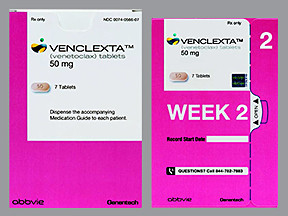
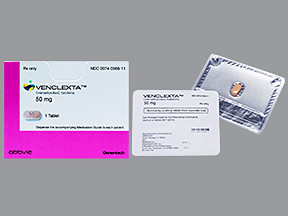
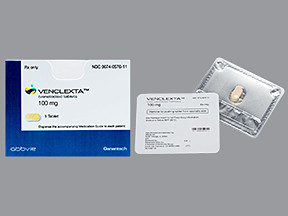
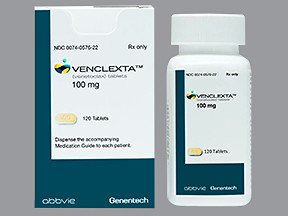
No Reviews Yet